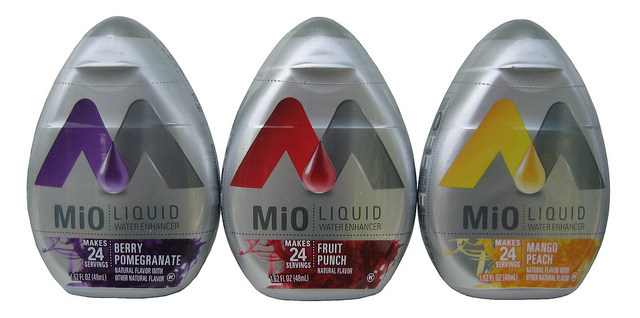(Photo credit: theimpulsivebuy/Flickr)
For the first time in 15 years, Coca-Cola saw a one per cent drop in its sale of carbonated drinks in the beginning of 2014. With obesity becoming a worldwide issue, people are looking for healthier beverage options.
According to the American Beverage Association, with 20 per cent of households already buying bottled water (which has its own health and environmental ramifications), flavour enhancers for water, such as Mio and Crystal Light, are the soda-alternative that has quickly cornered the marketplace. Liquid water enhancers were first introduced to grocery stores in 2011 and they’ve become a popular way to add flavour to H2O; so popular in fact that, according to a report by Zenith International, the category produced $412 million worth of sales in the US alone in 2013.
These may sound like a great way to spice up your water, but if you take a look at the labels, there are many ingredients you may not recognize.
What’s in it?
Some products include propylene glycol; and while Health Canada has approved it as a food additive, the chemical has a wide range of uses such as being an ingredient of antifreeze and cosmetics and is even used when creating artificial smoke. A test by NBC Chicago into various water enhancers found that, on average, propylene glycol accounted for 12 per cent of the product’s weight; this isn’t a toxic amount if only taken in small doses, however, if a 110-pound teenager drank the entire bottle in one shot, they would be ingesting five times the daily limit.
“He could well be potentially damaging himself at that kind of dose over that period of time because we do know there is an intermediate toxicity that affects the kidneys, the liver,” University of Illinois toxicologist Dr. Peter Orris told NBC Chicago.
Take sugar in moderation
Also, while many flavour enhancers boast that they are “calorie free”, they often contain high doses of artificial sugars that would affect your glucose levels. It is important to review the ingredients in such products to see if they include ingredients such as sucralose, acesulfame potassium (otherwise known as Acesulfame-K), aspartame and corn syrup, which are artificial sugars that shouldn’t be consumed in large doses.
A report published in the Trends in Endocrinology & Metabolism Journal found that those who drank artificially sweetened drinks faced a greater risk of type 2 diabetes, cardiovascular disease, metabolic syndrome and excessive weight gain as compared to people who don’t drink soft drinks. Also, the World Health Organization has been urging people to limit their sugar intake to below 25 grams per day, which is about six or seven teaspoons and only five per cent of a person’s daily calorie intake.
Caffeine
It is also important to note that some of these water enhancers contain caffeine, which is not recommended for consumption by children. Too much caffeine can be detrimental to a child’s health, leading to headaches, anxiety and sleep issues. Depending on the child’s age and weight, Health Canada recommends limiting the maximum daily intake of caffeine between 45 mg and 85 mg, which is about one to two cans of coke.
Moderation is key
With their easy to carry miniature bottles and a vast array of fun flavours to choose from, using enhancers can be a real treat. Besides offering delicious taste (which makes drinking the recommended 2-3 litres per day a little more palpable) many of the liquid enhancers on the market also boast benefits like having zero calories, being made with natural ingredients and containing added vitamins, potassium or salt. The great thing is that you can easily track the amount of flavouring (and therefore control the quantities of the additives going into your body) used by counting the number of drops you add to your drink. Being well hydrated is key to your body’s functionality; so as long as they’re used in moderation, liquid water enhancers are a great option for parents looking to encourage their children to drink more water.
If you’re at home with a little more time to spare, there are natural water flavouring options you can whip up in no time.
Strauss Water Canada’s WaterBar provides pure, great tasting water for better tea, coffee and hot and cold drinks, at your fingertips. Our triple water filtration and purification process kills micro-organisms and bacteria and absorbs the chlorine that can impair the taste of water. Water will be boiled instantly and dispensed at the touch of a button, which means no more buying, carrying or storing water. Tap into an unlimited supply of drinking water with our WaterBar.

One thought on “What you need to know about water enhancers”
Comments are closed.